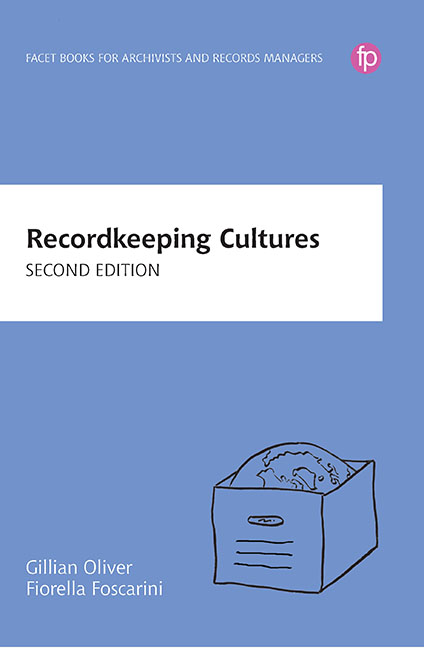7 - Corporate Information Governance and Recordkeeping and Systems and Tools
Published online by Cambridge University Press: 28 October 2020
Summary
This chapter considers the ICF at level three, the tip of the pyramid. Features at this level are open to change, but are most susceptible if they are approached with good understanding of the characteristics of the features at levels one and two.
Information governance is a very widely used phrase, so this chapter begins by discussing the concept in order to clearly differentiate our focus, which is specifically on the organisational information technology infra - structure and the recordkeeping systems and tools that this infrastructure supports. However, it is not possible to limit consideration to simply what is happening internally, because organisations rely increasingly on external services to carry out their operations. In particular, cloud computing cannot be ignored, as it has massive implications for recordkeeping. Security considerations, the need to manage the delicate balance between protecting records from unauthorised use while facilitating access, are discussed. Recordkeeping systems and tools are considered from the perspective that they need to be embedded in all systems. Assessment techniques are very practical and do not necessitate in-depth expertise in IT. Profiling provides an approach to reviewing corporate IT as reflected in the organisation's approach to information architecture. The coherence of the architecture can be identified by determining the extent to which the information systems in use interconnect. Key questions are: is the same data used by multiple systems? Is data re-entry required at any point? Are multiple logons required to accomplish related tasks?
Also relevant here are the organisation's IT policies and procedures, identifying any which may impact on employees’ recordkeeping behaviours and perhaps motivate unauthorised workarounds. The section on interventions suggests practical tips for working collaboratively with IT departments.
Information governance
Given the ever-increasing capacities to create and store information, information governance is a hot topic for society in general, and has been widely seen by the recordkeeping profession as an opportunity to demonstrate its relevance. As discussed by Geoffrey Yeo in his 2018 book, Records, Information and Data, since the beginning of the 21st century the term ‘information governance’ has been promoted as ‘a response, not just to the explosion of technology or to notions of an incipient Information Society, but also to the growth of what might be called the compliance agenda’ (Yeo, 2018, 66).
- Type
- Chapter
- Information
- Recordkeeping Cultures , pp. 111 - 126Publisher: FacetPrint publication year: 2019



